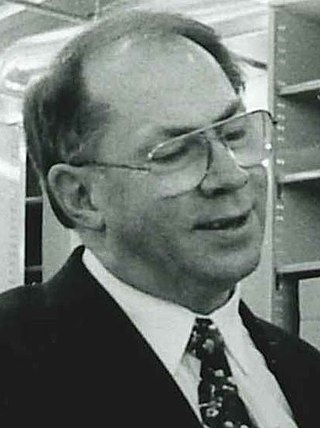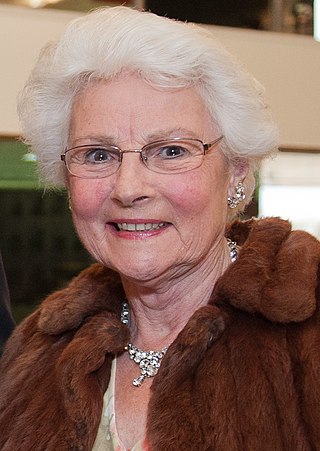The New Zealand National Party, shortened to National or the Nats, is a centre-right political party in New Zealand. It is one of two major parties that dominate contemporary New Zealand politics, alongside its traditional rival, the Labour Party.

The 2002 New Zealand general election was held on 27 July 2002 to determine the composition of the 47th New Zealand Parliament. It saw the reelection of Helen Clark's Labour Party government, as well as the worst-ever performance by the opposition National Party. The 2020 election would see it suffer a greater defeat in terms of net loss of seats.
United Future New Zealand, usually known as United Future, was a centrist political party in New Zealand. The party was in government between 2005 and 2017, first alongside Labour (2005–2008) and then supporting National (2008–2017).

Peter Francis Dunne is a retired New Zealand politician who was the Member of Parliament (MP) for Ōhāriu. He held the seat and its predecessors from 1984 to 2017—representing the Labour Party in Parliament from 1984 to 1994, and a succession of minor centrist parties from 1994. He was the Leader of Future New Zealand from 1994 to 1995, United New Zealand from 1996 to 2000, and United Future from 2000 to 2017.

United New Zealand was a centrist political party in New Zealand founded in 1995. It merged with the Christian-based Future New Zealand party to form the United Future New Zealand party in 2000.

Gordon Frank Copeland was a New Zealand politician who served as a Member of Parliament from 2002 to 2008. He entered the House of Representatives as a list MP for the United Future New Zealand Party from 2002 but he resigned from the party in 2007. In March 2009, Copeland became Party President of The Kiwi Party, which he had co-founded with another former United Future list MP, Larry Baldock, in May 2007. Copeland stood for the Conservative Party in the 2011 New Zealand general election. Prior to entering Parliament he held a number of corporate positions before working as the financial administrator for the Roman Catholic Archdiocese of Wellington.
The Kiwi Party was a political party operating in New Zealand between 2007 and 2011. Briefly known as Future New Zealand, it was a breakaway from the United Future New Zealand party and sought to carry on the tradition of Future New Zealand. The party was formed when MP Gordon Copeland left United Future after a dispute over support for the Crimes Amendment Act 2007. At the 2008 general election, the Kiwi Party was unsuccessful, and was not re-elected to Parliament. It did not contest the 2011 general election under its own banner, but the leaders and other members stood for the Conservative Party.

Graeme Ernest Lee is a former New Zealand politician. Originally a National Party MP, he broke away to found the Christian Democrat Party.

The 44th New Zealand Parliament was a term of the Parliament of New Zealand. Its composition was determined by the 1993 elections, and it sat until the 1996 elections.

Margaret Elizabeth Austin is a former New Zealand politician. She was an MP from 1984 to 1996, representing first the Labour Party and then briefly United New Zealand.
Pauline Mona Gardiner is a former New Zealand Member of Parliament, first for New Zealand National Party and then for United New Zealand. She was married to soldier, writer and public servant Wira Gardiner.
Peter Malcolm Hilt is a former New Zealand politician.

John Struan Robertson is a former New Zealand politician and later a New Zealand government-appointed Commissioner (2013).

The New Zealand electoral system has been mixed-member proportional (MMP) since the 1996 election. MMP was introduced following a referendum in 1993. It replaced the first-past-the-post (FPP) system New Zealand had previously used for most of its history. New Zealanders elect their members of parliament (MPs) with two votes. The first vote is for a candidate from an electorate. The second vote is used to elect ranked party lists.
Katrina May Shanks is a former New Zealand politician who was a list member of parliament for the National Party from 2007 to 2014.

Ōhāriu, previously spelled Ohariu and then Ōhariu, is a New Zealand parliamentary electorate returning one Member of Parliament to the House of Representatives. It first existed from 1978 to 1993, and was recreated for the 2008 election. In 2008, it was the successor to Ohariu-Belmont, first contested at the first mixed-member proportional (MMP) election in 1996. Through its existence Ohariu-Belmont was represented by Peter Dunne, leader of the United Future party. Dunne contested and won the recreated electorate in 2008. He announced on 21 August 2017, he would not be seeking re-election in the 2017 general election.

Wellington-Karori is a former New Zealand parliamentary electorate in the Wellington region, which existed for one parliamentary term from 1993 to 1996, and was held by Pauline Gardiner. In 1995, Gardiner defected from National to United New Zealand.
Centrism is a political outlook or position involving acceptance or support of a balance of social equality and a degree of social hierarchy while opposing political changes that would result in a significant shift of society strongly to the left or the right.

Gregory Eamon O'Connor is a New Zealand Labour Party politician and former police officer. He is the Deputy Speaker of the New Zealand House of Representatives, and has served as the Member of Parliament for Ōhāriu since the 2017 general election.
The Future Britain Group is a group of over 150 Labour parliamentarians set up in March 2019 by then-Deputy Leader of the Labour Party, Tom Watson, comprising those on the centre, centre-left and soft left of the party. The first meeting of the grouping is believed to have been attended by almost a third of Labour MPs. Its convener is MP Darren Jones.












